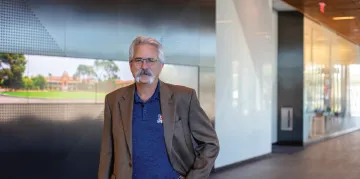
Q&A with Arthur “Barney” Maccabe, executive director of the Institute for Computation & Data-Enabled Insight (ICDI).
Machine learning and data science are rapidly changing what industry can accomplish if workers have the right skills and tools. Do universities have a responsibility there?
This has always been a challenge in society when new technologies emerge. The important thing is to meet people where they are.
We can offer certificates and applied master’s degrees as we’ve historically done, but that’s not a solution for everyone. We also need more innovative models, like services we’re building in ICDI, where people in industry can bring their own data and we work with them to extract information and teach them skills, including AI technologies, in the process.
The university’s Data Science Institute, led by Nirav Merchant, already offers a “bring your data” capability for faculty and graduate students on campus – our research workforce. It’s all about building “data acumen” for people who are already experts in their fields, especially with the rapid pace of technology advancement.
What about for students in K–12 or transferring from community colleges? Do universities have a role to play there?
It’s absolutely critical that we look at who’s potentially coming into a university and what preparation they need. That’s part of what the Data Sciences Academy, led by Joe Watkins, does. DSA works with K–14 programs across the state, rethinking how we’ve historically done things.
We learn calculus to know things about objects in motion and limits and optimization. Today, data science enables discovery in the same way. So should we still teach algebra in ninth grade? Or should we teach data and have algebra emerge from that in a more natural way? I think that’s the kind of discussion that needs to be had.
